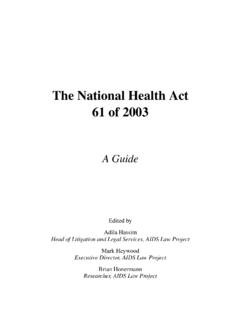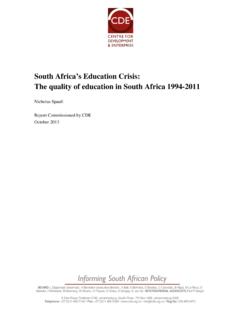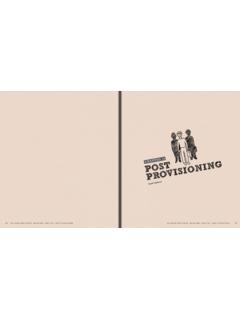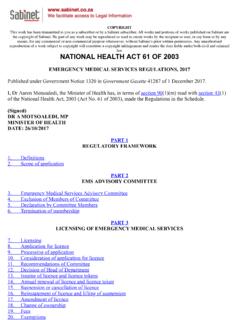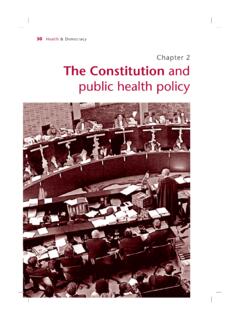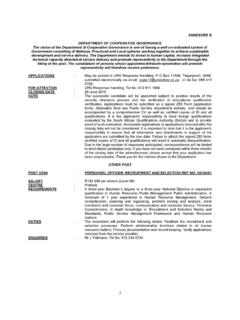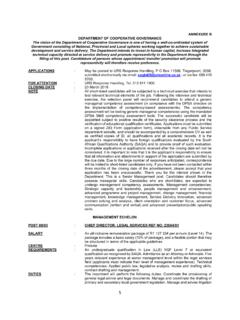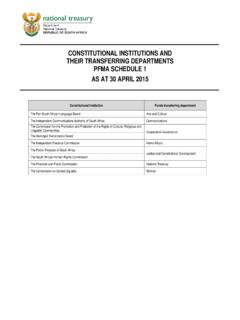Transcription of Basic Education Rights Handbook – Education …
1 CHAPTER 3 SCHOOL GOVERNANCES ebastian Mansfield-Barry and Lithalethemba Stwayi Basic Education Rights Handbook Education Rights in South Africa Chapter 3: School GovernanceBasic Education Rights Handbook Education Rights in South Africa Chapter 3: School Governance7574 ROLE PLAYERS IN SCHOOL GOVERNANCET here are a number of different groups of people responsible for governing a school. Various levels of government govern at national, provincial, district and circuit levels, while school governing bodies (SGBs) govern at a school are made up of parents of learners, learners, educators at the school and community members where the school is located.
2 The Minister of Basic Education , representing the Department of Basic Education (DBE), is responsible for governing schools on a national head of the provincial department of Basic Education (provincial DBE) in each province is responsible for carrying out school governance on a provincial level. Each province is divided into a number of Education districts, which are run by district directors based at the district office. Education districts are themselves divided into a number of Education circuits, which are areas run by circuit offices and headed by circuit managers. Circuit offices act in terms of functions delegated by each district office, and play a key role in connecting schools with district offices and provincial DBEs.
3 BACKGROUNDU nder apartheid, South African schools were divided along racial lines. The government during those years provided five times more funding to schools for white children than it did to schools for black children. This resulted in an unequal Education system that we are still trying to fix today. However, there were some significant changes to our Education system when South Africa became a democracy. These changes included embedding certain values into Education law, with the aim of improving the quality of Education for all learners. One such value was to run schools democratically, such that parents, educators and community members could all get involved.
4 Another value is the idea that the people and groups who run a school should work in co-operation with each other and avoid power change is that school rules and policies must be be in conformity with the Constitution, and must meet Basic minimum standards established by national laws and details of how the various groups and tiers of government in Education work together is set out in laws on school governance such as the South African Schools Act 84 of 1996 (the Schools Act).The Schools Act sets out important rules concerning who is involved in running a school and what they are responsible LEVELM inister of Basic Education & Department of Basic EducationPROVINCIAL LEVELMEC & Provincial Department of Basic EducationDISTRICT LEVELD istrict directors & officesCIRCUIT LEVELC ircuit managers & officesSCHOOL LEVELS chool Governing Bodies: parents, learners, teachers & community Basic Education Rights Handbook Education Rights in South Africa Chapter 3: School GovernanceBasic Education Rights Handbook Education Rights in South Africa Chapter 3.
5 School Governance7776 MEMBERS OF SGBS AND HOW THEY ARE ELECTEDA school governing body is made up of automatic members, elected members and co-opted members. The school principal is automatically a member of the SGB. People who can be elected to the SGB include parents of learners at the school, teachers at the school, certain learners at the school, and members of staff who are not educators. Members of the community can also form part of the SGB, as they can assist the school with various kinds of special knowledge or skill. They may include people such as doctors, accountants or SGB is expected to elect office bearers from among its members, including a chairperson, a treasurer and a secretary.
6 The chairperson should be a parent member. An SGB election follows a specific procedure, as set out in the Schools Act. The school s electoral officer must send out notices announcing the nomination meeting and the election meeting. A school electoral officer is a person who has been trained by the Independent Electoral Commission (IEC) this person may be a principal or teacher from another school. The date, time and place of a meeting must be stated on the notice. The notices should be sent out at least 14 days before the meeting; a hard copy should be handed to every learner, which they must give to their parents. Other methods of communication (such as SMS) can be used, as long as they do not disadvantage any member of the school person who is willing to be a member of the SGB may only be nominated and seconded by a person belonging to the same SGB membership category.
7 A nomination form, completed by the nominator, candidate (person who is willing to be a member of the SGB) and seconder must be handed to the electoral officer not more than seven days and not less than 24 hours before the election meeting. A member can be proposed during the nomination section of the meeting, provided that another person from the same category seconds the nomination on the relevant template. A quorum of 15% of parents on the voters roll is needed for the election and nomination meeting to proceed; if this quorum is not present, the meeting must be set for another day (for example, if there are 200 parents in the school, then 30 of them must be at the meeting).
8 Voting happens on ballot papers. Each ballot paper should have the school stamp on it, or some other distinguishing feature to prevent tampering. A person with the right to vote must record their vote secretly and deposit it into the ballot box. After the votes are counted, each chosen SGB member must be informed of their election in school principal must organise the first meeting of the SGB within 14 days of the election, so that the new SGB members may be elected. Once they have been chosen, the principal must inform the district manager in writing of people who have been OF THE ROLE PLAYERSAll of these role players must work together to achieve every learner s right to Education .
9 The different jobs that these role players have are set out in the law, such as the Schools Act and its regulations. The school governing body (SGB) in each school is responsible for the everyday management of the school. The SGB must decide on and carry out school policies that are suitable for the school. Having fair policies about admissions to and exclusions from school helps to protect the Rights of children to work done by SGBs also aims to protect the Rights of children in schools by facilitating the fair implementation of school rules. SGBS are required to have policies that protect and promote learners Rights in respect of the following: school discipline; pregnancy; school fees; language; religion and SGB also has a supportive role to play in the school, in addition to the functions described above.
10 It must make sure that the school is governed in the best interests of all the stakeholders. The SGB must not interfere in the professional management of the school, but should support academic staff in executing their SGB should also encourage partnerships with people with expertise to assist the school. Fundraising is another supportive duty. The SGB can raise funds to supplement the school s income. The role of the Minister of Basic Education is to create Basic standards that all schools should meet in order to provide adequate Education for everyone. For example, the Minister published the Regulations Relating to Minimum Uniform Norms and Standards for Public School Infrastructure, to which all provincial governments are required to provincial DBE has a duty to create enough schools for all the learners in the province.
